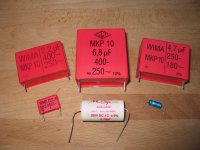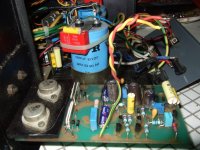Depends. Do you want lowest ESR? That can be a problem with some supplies. Lowest DF? Ditto. Smallest package size? That can be useful in some designs, but the tradeoffs may work against you in others.
The datasheets are on Wima's site and bear looking at. That way, you can decide what represents the best tradeoff for your design goals.
http://www.wima.com/EN/WIMA_MKP_4.pdf
http://www.wima.com/EN/WIMA_MKP_10.pdf
The datasheets are on Wima's site and bear looking at. That way, you can decide what represents the best tradeoff for your design goals.
http://www.wima.com/EN/WIMA_MKP_4.pdf
http://www.wima.com/EN/WIMA_MKP_10.pdf
For DC blocking in the signal path, I like the MKP10. I used them on several of my no oversampling Philips CDPs and preferred them over some far more expensive models (different Audyn Caps, Mundorf MCaps etc.).
The only problem with them is their size – they are huge! And it can be quite difficult to buy them in larger values.
An interesting comparison can be found on the following website:
Humble Homemade Hifi
Best regards,
StefanAC
The only problem with them is their size – they are huge! And it can be quite difficult to buy them in larger values.
An interesting comparison can be found on the following website:
Humble Homemade Hifi
Best regards,
StefanAC
Attachments
Hi StefanAC,
Do you know where the caps are used by the author for listening evaluation. I thing placing the cap in rails decoupling or DC blocking in signal path may lead to different result. DC blocking in signal path may have larger impact to sonic performance?
Do you know where the caps are used by the author for listening evaluation. I thing placing the cap in rails decoupling or DC blocking in signal path may lead to different result. DC blocking in signal path may have larger impact to sonic performance?
The only problem
Be aware that there's a difference of construction between old and new production of the same type series, not only the outer shape.
I wonder if using the low ESR of MKP as decoupling may increase the risk of ringing on the supply rails?
I would be tempted to compare lossy ceramics and the slightly higher ESR of MKS/MKT for decoupling purposes.
For DC blocking of Audio signal the better the MKP/FKP, the better the reports we hear about sound quality.
I would be tempted to compare lossy ceramics and the slightly higher ESR of MKS/MKT for decoupling purposes.
For DC blocking of Audio signal the better the MKP/FKP, the better the reports we hear about sound quality.
I had MKP 10 over 15.000uF LCR PSU caps in my old lateral Mosfet JLH 100W amp. When I made a restoration, I pulled them out and the amp became subjectively more coherent in the treble, by a good margin. Andrew is right, we must know we don't upset an amp that has been designed with lossy filter caps when making additions.
Attachments
provided you test the final arrangement to check for stability.WIMA suggests MKS2,4 and MKP4 for supply decoupling. WIMA
- Status
- Not open for further replies.
- Home
- Design & Build
- Parts
- WIMA MKP 4 and MKP 10

